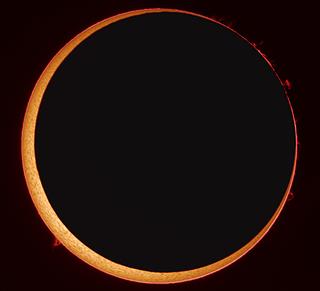Eclipse's Shadow to Fall Near Unalaska

Thursday, May 17 2012
On the off chance that there are clear skies in Unalaska on Sunday, residents may a get a choice view of the millennium’s first annular eclipse.
According to NASA, the eclipse should begin at 2:50pm, reach its peak at 4:24pm, and then wrap up at 5:54pm. Because Unalaska lies less than 200 miles from the path of the eclipse’s shadow, nearly 90 percent of the sun will be covered up. The sun will appear as a crescent tucked behind the moon. Residents of Adak and Atka could be able to see an almost perfect ring of fire around the moon, since those islands are closer to the shadow.
Right now, the National Weather Service expects Sunday to be cloudy. If it the sun is obscured, skies are expected to darken considerably across the Aleutians – it should feel like dusk is occurring much earlier than usual.
Amateur astronomer Vic Fisher is looking forward to the eclipse, and he has a plan if the weather doesn’t cooperate.
“If it’s foggy, I want to climb a mountain and see if I can get as high as I can. You know, some of the mountain out here, you can get above the fog,” says Fisher. “So, that’s a possibility.”
Fisher – who works part-time for Unalaska Community Broadcasting – has seen a total eclipse before, but never an annular one.
“A lot of people think they’re one of the most beautiful eclipses,” says Fisher.
Fisher says that annular eclipses are especially neat because they can play tricks with the light. He says that in places with lots of trees, you can see little half-moon shapes around shadows of leaves. Fisher has a trick for mimicking that effect in Unalaska.
“You can kind of reproduce that by maybe putting your fingers out, and maybe letting the sun shine through,” says Fisher.
To view the eclipse on Sunday, you can project the image of the sun through a hole in a cardboard box or wear welding goggles. Ordinary sunglasses do not offer enough protection for eclipse viewing, and staring directly at the sun can cause blindness.
Sunday’s eclipse is part of an 18-year cycle that will begin again in 2030.
(Video credit: Stephanie Joyce/KUCB)



